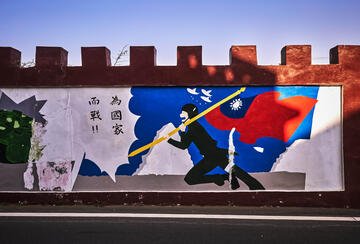APARC Newsletters
Sign up to receive updates from our experts and programs delivered to your inbox.
Oriana Skylar Mastro has built two careers simultaneously: one as an academic, the other, as a service member in the U.S. Air Force.
America's Future in Taiwan
Intensifying threats of a military conflict over Taiwan have brought uncertainty to the stability of regional security for Southeast Asia, according to Center Fellow Oriana Skylar Mastro on radio show On Point.
Each year, the Global Affiliates Program hosts at APARC a cohort of qualified personnel nominated by our affiliate members, who send their talent to Stanford as visiting fellows for a year of research and enrichment.

Empirical evidence by Karen Eggleston and colleagues suggests that better primary health care management of chronic disease in rural China can reduce spending while contributing to better health.

APARC's new edited volume, 'The North Korean Conundrum,' shines a spotlight on the North Korean human rights crisis and its connection to nuclear security. In the book launch discussion, contributors to the volume explain why improving human rights in the country ought to play an integral part of any comprehensive U.S. engagement strategy with the DPRK.

On CNN's GPS with Fareed Zakaria, APARC Center Fellow Oriana Skylar Mastro shares insights about China's aspirations to take Taiwan by force and the United States' role, should a forceful reunification come to pass.
APARC Center Fellow Oriana Skylar Mastro shares insights about China's hypersonic missile capabilities, and the implications of further military buildup.

Amidst the crisis in Myanmar, Burmese investigative journalist Swe Win, editor-in-chief of the independent news outlet Myanmar Now, continues to lead the newsroom from exile while his team is in hiding.

APARC and Korea Program Director Gi-Wook Shin shares insights on rising anti-China sentiments in South Korea and their implications for the upcoming South Korean presidential election.
In Defense of AUKUS
This is not only about nuclear-powered submarines; it is about a strengthened US commitment to Australia.
“We need an all hands on deck approach underpinned by partnership and cooperation to succeed...we must unite all global citizens and nations...indeed we are truly all in this together.”
AUKUS Is Deeper Than Just Submarines
While the Australia-UK-US security pact shows a seriousness about naval power, the biggest story is the radical integration of leading-edge defense technology and a new approach to alliances, South Asia Research Scholar Arzan Tarapore argues.
In a new interview with The Korea Herald, Gi-Wook Shin discusses ethnic homogeneity, its nationalist roots, and the limitations to building multicultural identity in South Korea.

At an in-person address to a panel of parliament members and Stanford scholars, Speaker Gombojav Zandanshatar assessed the nation's experiment in deliberative democracy and offered reflections on the challenges that face maturing democracies.

The Center offers fellowships for postdoctoral scholars specializing in contemporary Asia, Japan, and Asia health policy and for experts on Southeast Asia.

In a New York Times opinion piece, Center Fellow Oriana Skylar Mastro argues that the U.S. withdrawal from Afghanistan does not represent a potential catalyst for an impending Chinese attack on Taiwan.

Crabtree, an assistant professor at Dartmouth College, researches discrimination in politics, particularly in Japan.

With support from Shorenstein APARC’s Diversity Grant, coterminal student Ma’ili Yee (BA ’20, MA ’21) reveals how Pacific island nations are responding to the U.S.-China rivalry by developing a collective strategy for their region.

Emmerson talks to VnExpress about the implications of Harris’ visit to Hanoi, the first such visit by a U.S. vice president.

Strait of Emergency?
Strait of Emergency?
Debating Beijing’s Threat to Taiwan

The study’s co-authors, including Karen Eggleston, find that health care expenditures among Chinese covered by relatively generous health insurance significantly increase at retirement, primarily due to an increase in the number of outpatient visits.

While public support in Japan has been lackluster for the 2020 Tokyo Olympic Games, the mood may change once the games start – provided no major public health incidents and other unfortunate accidents occur, says Stanford sociologist Kiyoteru Tsutsui.

Jain is the recipient of the inaugural Adam Wagstaff Award for Outstanding Research on the Economics of Healthcare Financing and Delivery in Low- and middle-Income Countries. Her award-winning paper provides the first large-scale evidence on the behavior of private hospitals within public health insurance in India.










